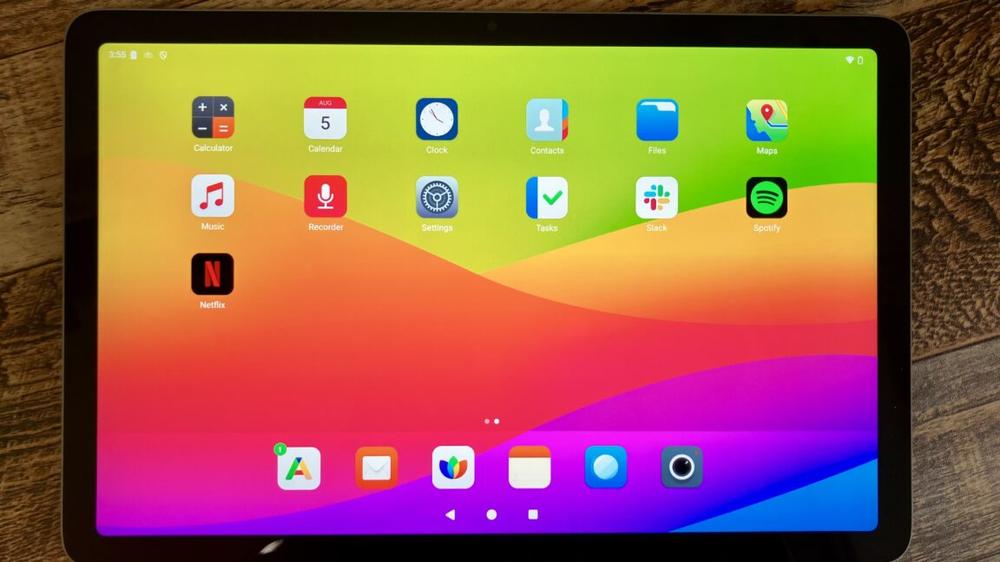A lot of people are overly reliant on Google. They put all of their important messages, appointments, musings, contacts, and spreadsheets into Google products. Many are aware that Google, like many tech firms, is likely to prioritize its own interests over user privacy. But signing data away for technological conveniences is a common occurrence.
Murena's Pixel Tablet takes a stance against that norm. It's Google’s Pixel Tablet hardware running an Android fork but without any Google tracking or Google apps. While I still found myself heading back to Google services while using the tablet, Murena’s gadget reminded me of how feasible it is to limit Big Tech’s reach into my life.
De-Googled Android
Instead of running standard Android like Google’s 2023 Pixel Tablet, Murena’s Pixel Tablet runs /e/OS, an open source mobile operating system (OS) built by e Foundation. Mandrake Linux distribution creator Gaël Duval founded /e/OS, which is a fork of LineageOS, an open source version of Google's Android source code.
Rather than using Google apps, Murena preloads the tablet with open source alternatives, including a fork of K9-mail in lieu of Gmail and, instead of Chrome, a Chromium-based web browser with specific /e/OS settings and an ad blocker on by default. The /e/OS App Lounge replaces Google’s Play Store and makes it easy to find open source and progressive web apps. You still get access to apps from the Play Store, and I had no trouble running Google apps, like Google Docs or Google Sheets. But while the Play Store forces you to have a Google account for downloads, you don’t need an account for downloading apps from the App Lounge, and Murena doesn’t know which apps you use.
Another App Lounge standout is its privacy ratings for apps. They’re calculated by adding a tracker score, based on the number of trackers found by auditing platform Exodus Privacy, to the number of permissions the app requests. The Google Maps app, for example, has a privacy rating of zero out of 10 on the App Lounge.
It’s great to take steps to secure your digital life more, but if you buy a tablet, it likely has an OS managed by a Big Tech company with a history of and capabilities for heavy user tracking. Murena's Pixel Tablet is a user-friendly alternative that still feels like a mainstream device.
Using the device proved to me that a non-Google or Apple tablet can still run smoothly and intuitively while being easy to navigate and compatible with common apps. It's also refreshing to see a personal system that doesn't require an account for full use.
If you're interested, though, you can create a Murena account for access to a Murena Workspace, where you'll have a Murena email address, as well as a calendar and contacts list. Murena says that it doesn't scan Workspace data, log app usage, sell your data, or use ads in its online services.
But realistically, I won't be ditching Google's or Apple's alternatives. /e/OS doesn’t offer a simple way to migrate data, such as emails or calendars. E Foundation’s support documentation has instructions for manually importing contacts from Google and data from iPhone and iCloud to Murena’s Workspace. But /e/OS lacks ways to import other desirable data, such as Google Calendars.
I was also unable to get my Gmail accounts to sync with Murena’s email app, due to browser incompatibility issues that Google cited. Third-party apps could help with some of this, but Murena's built-in tech doesn't make it easy enough to access data from Google and Apple accounts.
Murena's tablet pushed me to use Google Search—whose ads, AI, and seemingly arbitrary algorithms have atrophied its search experience in recent years—less. The tablet's built-in browser defaults to Murena Find, which is essentially Qwant. “It is built to give you powerful search results without any of the tracking, profiling, or targeted ads you’d get with mainstream engines,” e Foundation’s announcement of the search engine said.
There were times when a side-by-side comparison found Google’s results to be more aligned with what I had in mind. However, I quickly appreciated Qwant’s lack of AI-generated responses, Google Maps listings, rows of advertisements, and other distractions ahead of actual results. For example, the top results for a search for “Brooklyn rooftop bars” with the Qwant-based engine were roundups from different blogs and publications. Google’s top results were a map, a few bars' individual websites, posts from Reddit and Instagram, and only two curated lists (one from a news publication and another from Yelp).
The tablet is weaning me off of Google Search, but I’ll likely download Google Maps soon. Murena's tablet comes with Magic Earth, the only non-open source app preloaded onto the device. However, without Street Views, speedier response, more detailed public transit information (like the names of stops you have to pass), and easier ways to find points of interest, like restaurants, Magic Earth is not sufficient for replacing Google’s alternative—despite Maps' low privacy rating.
More privacy, please
Despite the inconveniences of a truly Google-free tablet, using Murena’s Pixel Tablet encouraged me to push for more online privacy. It’s proof that privacy-centric tablets and other gadgets are not only possible, but also worthwhile. With Big Tech often failing to protect users, gadgets that don’t spy on you deserve a bigger spotlight.
One of /e/OS's best features is its privacy reports, which provide an overview of the apps tracking you.
The tablet’s privacy menu also has a toggle for hiding your IP address, although Murena notes that you may want to think twice before sending emails, as “your address may end [up getting a] permanent ban from your provider.” Both features give users more control without introducing complexity and place a much greater emphasis on understanding online privacy than what you find among other tablets.
Murena’s Pixel Tablet, while not perfect, proves that a privacy-forward tablet doesn’t have to come with trade-offs. Devices like this make privacy a competitive advantage that other companies should emulate.

 From meme to animal control: The USDA is apparently utilizing the fight scene in “Marriage Story” to train wolves to avoid humans
From meme to animal control: The USDA is apparently utilizing the fight scene in “Marriage Story” to train wolves to avoid humans